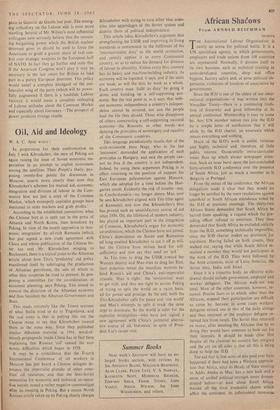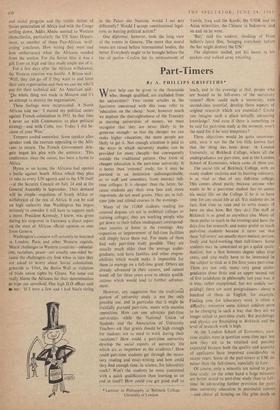African Shadows
From ARNOLD BEICHMAN
GENEVA
THE International Labour Organisation is rarely an arena for political battle. It is a UN specialised agency, in which governments, employers and trade unions from 108 countries are represented. Normally, it devotes itself to its own business, such as technical training in underdeveloped countries, shop and office hygiene, factory safety and, of some political im- portance, violations of freedom of association by governments.
Since the ILO is one of the oldest of our inter- national organisations—it was written into the Versailles Treaty—there is a continuing tradi- tion of fraternity and good fellowship at its annual conference. Membership is easy to come by. Any UN member nation can join the ILO by a simple letter of notification that it will abide by the ILO charter, an assurance which means everything and nothing.
Much of the ILO's work is useful, virtuous and highly technical and, therefore, of little public interest. Occas;onally extra-curricular issues flare up which attract newspaper atten- tion. Such an issue burst upon the just-concluded forty-seventh ILO conference over the presence of South Africa, just as much a member as is Bulgaria or Portugal.
From the outset of the conference, the African delegations made it clear that they would no longer be satisfied by the mere resolutions against apartheid or South African attendance voted by the ILO at previous meetings. The thirty-two African States demanded that South Africa be barred from speaking, a request which the pre- siding officer refused to entertain. They then demanded that South Africa be excluded entirely from the ILO, something technically impossible, since the ILO charter makes no provision for expulsion. Having failed on both counts, they walked out, saying that while South Africa re- mained a member they would not participate in the work of the ILO. They were followed by the Arab countries, most of Latin America, the Soviet bloc, India and Israel.
Since it is a tripartite body, an effective with- drawal should include government, employer and worker delegates. The African walk-out was total. Most of the other countries, however, re- turned. 'Precise facts as to which, other than the Africans, stopped their participation are difficult to come by, because in some cases workers' delegates missed one or two of the daily sittings and then returned or the employer delegate re- turned late from lunch. The Soviet bloc returned en masse, after assuring the Africans that by so doing they would have someone to look out for their interests. It should be made clear that despite all the clamour no country has res;gned and the cry on all sides is that all this is being done to help the ILO.
The sad fact is that none of this geed ever have happened if there had been a Western apprecia- tion that Africa, since its Heads of State meeting in Addis Ababa in May, has a new look and a sense of unified political strength never demon- strated before—at least about South Africa. Amidst all the rival irredentist claims which afflict the continent, its infinitesimal economic and social progress and the visible defeat of Soviet penetration of Africa and with the Congo settling down, Addis Ababa seemed to Western chancelleries, particularly the US State Depart- ment, as another of those Pan-African 'wolf- crying' conclaves. How wrong they were and ho v embarrassed when the Africans seceded from the session. For the Soviet bloc it was a gift from on high and they made ample use of it.
For a few days after the African withdrawal, the Western reaction was hostile. A Briton said: 'W:11, they can go off if they want to and form their own organisation and then we can see who'll pay for their technical aid.' An American said: 'the whole thing was made in Moscow and it's an attempt to destroy the organisation.'
These feelings were reciprocated. A North African told me: 'I started my political career against French colonialism in 1951. In that time I never sat with Communists to plan political strategy—and with Cuba, too. Today I did be- cause of your West.'
Tempers cooled somewhat. Soon speaker after speaker took the rostrum appealing to the Afri- cans to return. The French Government dele- gate began his plea with the sentence: 'This conference, since the outset, has been a hymn to Africa.'
Hymn or no hymn, the Africans had opened a battle against South Africa which they plan to take to every UN agency and to the UN itself —at the Security Council on July 24 and at the General Assembly in September. Their demand will be simple—expulsion of South Africa or withdrawal of the rest of Africa_ It can be said on high authority that Washington has begun seriously to consider it will have to support such a move. President Kennedy, I know, was given during his stop-over in Germany a direct report on the state of African official opinion as seen from Geneva.
Washington's concern will certainly be matched in London, Paris and other Western capitals. Moral challenges to Western countries----colonial- ism, racialism, peace---are usually one-sided be- cause the challengers cry foul when in turn they are asked to worry about Soviet colonialism, genocide in Tibet, the Berlin Wall or violation of trade union rights by Ghana. Yet none can really blame the Africans for their determination to wipe out apartheid. One high ILO officer said me : 'If 1 were a Jew and I had Nazis sitting in the Palais des Nations, would I act any differently? Would I accept constitutional legal- isms as barring political action?'
One diplomat, however, took the long view of the events in Geneva. The more that moral issues are raised before international bodies, the better. Everybody ought to be brought before the bar of justice--Ceylon for its mistreatment of Tamils, Iraq and the Kurds, the USSR and its Asian minorities, the Chinese in Indonesia, and on and on he went.
'But,' said his auditor, thinking of Petet Sellers's latest film, 'bringing everybody before the bar might destroy the UN.'
The diplomat smiled, put his hands in his pockets and walked away whistling.































 Previous page
Previous page